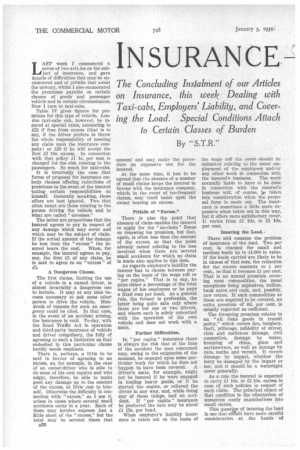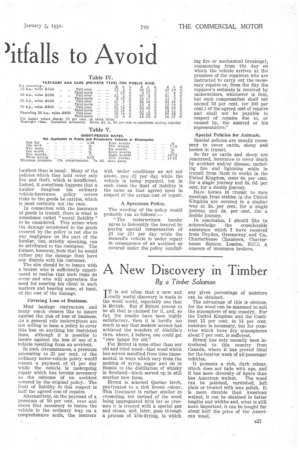INSURANCE
Page 40

Page 41

If you've noticed an error in this article please click here to report it so we can fix it.
'itfalls to Avoid
LAST week I commenced a series of two arth les on the subject of insurance, and gave details of difficulties that may be encountered and of pitfalls that await the unwary, whilst I also enumerated the premiums payable on certain classes of goods and passenger vehicle and in certain circumstances. Now I turn to taxi-cabs.
Table IV gives figures for premiums for this type of vehicle. London taxi-cabs can, however, be insured at special rates, amounting to £22 if free from excess (that is to say, if the driver prefers to throw the whole responsibility of meeting any claim upon the insurance company) or £20 if he will accept the first £2 10s. excess. In connection with that policy £1 1s. per seat is charged for the risk relating to the passengers. So much for taxi-cabs.
It is invariably the case that forms of proposal for insurance embody clauses offering reductions of premiums in the event of the insured taking certain responsibilities on himself. Generally speaking, these offers are best ignored. Two that often tempt are those relating to the person driving the vehicle and to what are called "excesses."
The latter are proportions that the Insured agrees to pay in respect of any damage which may occur and which may be the subject of claim. If the actual amount of the damage be less than the " excess " the in
sured bears the cost. When, for example, the insured agrees to pay, say, the first £5 of any claim, he is said to agree to an "excess" of £5.
A Dangerous Clause.
The first clause, limiting the use of a vehicleto a named driver, is almost invariably a dangerous one to include. It may at any time become necessary to ask some other person to drive the vehicle. Hundreds of reasons for such an emergency could be cited. In that case, in the event of an accident arising, the insurance is void. To-day, with the Road Traffic Act in operation and third-party insurance of vehicle and driver compulsory, the folly of agreeing to such a limitation as that embodied in this particular clause hardly needs emphasis.
There is, perhaps, a little to be said in favour of agreeing to an excess, as, for example, In the case of an owner-driver who Is able to do some of his own repairs and who might, therefore, be able to make good any damage up to the amount of the excess, at little cost to himself. Otherwise the difficulty in connection with "excess," as I see it, arises in cases where several small accidents occur in a year. Each of them may involve expense just a little short of the "excess," but the total may be several times that
n26 amount and may make the procedure an expensive one for the insured.
At the same time, it has to be agreed that the absence of a number of small claims keeps the insured in favour with the insurance company, which, in the event of too-frequent claims, may itself insist upon the owner bearing an excess.
Pitfalls of "Excess."
There is also the point that absence of claim enables the insured to apply for the "no-claim" flonus on renewing his premium, but that, again, is often less than the amount of the excess, so that the point already raised relating to the loss involved when there are several small accidents for which no claim Is made also applies to this item.
As regards employer's-liability the Insurer has to choose between paying on the basis of the wage roll or "per capita." That is to say, he pays either a percentage of the total wages of his employees or he pays a fixed sum per head. As a general rule, the former is preferable, the latter being quite safe only where there are but one or two drivers, and where each is solely concerned with the operation of his own vehicle and does not work with a mate.
Further Difficulties.
In "per capita" insurance there Is always the risk that at the time of the accident the man concerned may, owing to the exigencies of the moment, be engaged upon some particular work for which he does not happen to have been covered. A driver's mate, for example, might not be insured if he were engaged in loading heavy goods, or if he started the engine, or relieved the driver in any way, and, while doing any of these things, had an accident. If "per capita" insurance be preferred the rate may be about 15s. per head.
When employer's liability insurance is taken out on the basis of the wage roll the cover should be unlimited relating to the usual employment of the employees and/or any other work in connection with the insured's business. The work normally liable to have to be clone in connection with the insured's business will, of course, be taken into consideration when the proposal form is made out. The insurance is sometimes a little more expensive when taken out in this way, but it offers more satisfactory cover. It varies from £1 10s. to £2 10s. per cent.
Insuring the Load.
There still remains the problem of insurance of the load. Two per cent, is charged for small and medium loads up to £1,000 in value. If the loads carried are likely to be in excess of that sum, the reduction for the excess amounts to per cent., so that it becomes l per cent. That is an annual premium covering most commodities, the usual exceptions being explosives, bullion, bank notes and cash, and, possibly, raw cotton. If such commodities as these are required to be covered, an extra premium of 6d. per cent, is usually regarded as sufficient.
The foregoing premium relates to an "all risks goods in transit policy," which covers fire, burglary, theft, pilferage, infidelity of driver, riots and malicious damage, civil commotion, damage by water, breaking of china, glass and earthenware, as well as damage by rats, moths and vermin. It covers damage by impact, whether the lorry be damaged by the impact or not, and it should be a watertight cover generally.
As a rule the insured is expected to carry £1 10s. to £2 10s. excess in case of such policies in respect of each claim. The principal object of that condition is the elimination of numerous costly examinations into small claims.
This questto of insuring the load Is one that srauld have more careful consideration at the hands of
hauliers than is usual. Many of the policies which they hold cover only fire and theft, which is insufficient. Indeed, it sometimes happens that a_ haulier imagines his ordinary vehicle-insurance policy covers risks to the goods he carries, which is most certainly not the case.
In connection with the insurance of goods in transit, there is what is sometimes called "moral liability" to be considered. This arises when the damage occasioned to the goeds covered by the policy is not due to any negligence on the part of the haulier, but, strictly speaking, can be attributed to the consignor. The former, however, feels that he would rather pay the damage than have any dispute with his customer.
The aim should be to insure with a broker who is sufficiently experienced to realize that such risks do occur and who will appreciate the need for meeting his client in such matters and bearing some, at least, of the cost of the damage.
Covering Loss of Business.
Most haulage contractors and many coach owners like to insure against the risk of loss of business. As a general rule undervegiters are not willing to issue a policy to cover this loss on anything but restricted lines, although it is possible to insure against the loss of use of a vehicle resulting from an accident.
In such circumstances, a premium amounting to 25 per cent. of the ordinary motor-vehicle policy would ensure a payment of per day while the vehicle is undergoing repair which has become necessary as the outcome of , an accident covered by the original policy. The limit of liability in this respect is half the agreed cost of repairs.
Alternatively, on the payment of a premium of 50 per cent, over and above that necessary to insure the vehicle in the ordinary way on a comprehensive scale, the insurers
will, under conditions as set out above, pay £2 per day while the vehicle is being repaired, but in such cases the limit of liability is the same as that agreed upon in respect of the actual cost of repair.
A Specimen Policy.
The wording of the policy would probably run as follows:—
"The underwriters hereby agree to indemnify the insured by paying special compensation of (or £2) per day while the insured's vehicle is under repair in consequence of an accident as covered under the policy (exclud
ing fire or mechanical breakage), commencing from the day on which the vehicle arrives at the premises of the repairers who are instructed to carry out the necessary repairs or, from the day the repairer's estimate is received by underwriters, whichever is first, but such compensation shall not exceed 50 per cent. (or 100 per cent.) of the agreed cost of repairs and shall not be payable in respect of repairs due to, or caused by, , the assured or his representative."
Special Policies for Animals.
Special policies are usually necessary to cover cattle, sheep and horses in transit.
So far as cattle and sheep are concerned, insurance to cover death by accident and/or disease, Including fire and lightning while in transit from farm to works in the United Kingdom, costs 4s. per cent. for a single journey and 6s. 6d. per cent, for a double journey.
Race horses in transit to race meetings from stables in the United Kingdom are covered in a similar way at Ss. per cent, for a single journey and 5s. per cent, for a double journey.
In conclusion, I should like to acknowledge the considerable assistance which I have received from Dryden, Greenaway... and Co,. Charterhouse Chambers, Charterhouse Square, London, D.C.1, a concern of insurance brokers.




























































































